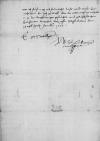Dem durchlauchtenn, hochgebornen furstenn unnd hern, / hern ⌊Albrecht⌋, [marggraffe]n zcw ⌊Brandenburgk⌋, [herczigk] in ⌊Prewssen⌋, / meinem [fru]ntlichen, liebenn hernn /
Durchlauchter, hochgeborner furst, / freuntlicher, lieber her. / Meÿnne freuntliche, willige dienst zcuvoran etc.
Es seinn mir abermols briffe ann Ewer Gnaden vonn meÿnnem gutten brwder, dem hernn ⌊Nÿbschicz⌋, an Ewer Gnaden zcwkomen, / welche ich hiemit Ewer Gnaden zcwschicke, / aus welchenn Ewer Gnaden wirt vorstehenn, wie der friede allenthalbenn mit dem ⌊Turcken⌋ gemacht. / Es ⌊⌋ mir aber vonn ⌊Wienn⌋ aus ⌊Osterreich⌋, datum XXVIII(!) Marcÿ, / meÿnn gut freundt her ⌊Cornelius Scepperus⌋, ⌊kaÿserlicher maiestet⌋ inn ⌊Hungernn⌋ commissarius unnd orator, / das der frid nicht so gemacht seÿ, wie des woÿwoden parteÿ vonn sich gibt, / sunder, / das so nu der ⌊Turcke⌋ czwir inn Hungernn gewest / unnd nicht sunders ausgericht, / so dar vonn geczogenn / unnd domit beÿ denn seinen / nicht wenigk seiner achtung vorlorenn, / das er nicht allein zcum frid geneigt, / sunder auch begert habe / unnd ⌊romische konigliche maiestet⌋ nicht ein fuszbreidt lands, / auch kein pfennigk tributs, das konigkreich zcw Hungernn zcw besiczenn, / im hab abgetrettenn oder noch gegebenn. / Schreibt mir auch, das, / wÿe sein altenn, vortrautenn freundt, / domit ich sein gloebenn gebenn sol, / das concilium sol im jor mit der stelle benumpt werdenn / unnd II jor dornoch gehaltenn, / item, das vom ⌊konige vonn Franckreich⌋ nichts seÿ zcwbesorgen. / ⌊Kaÿserliche maiestet⌋ hab inn ⌊Italienn⌋ VII-M deutscher alter knecht / unnd sovil spaniger / unnd bisz inn die VIII-M schwere und geringe pferde, / unnd das kaÿserliche maiestet denn XIIII dis monadts vonn ⌊Genua⌋ sol inn ⌊Hispanienn⌋ uberfarenn. / Sunst ist beÿ mir nichts newes, das Ewer Gnaden nicht vor geschriebenn. Wor ich sunst Ewer Gnaden vil fruntlichs dinsts werde wissen zcwerczeigenn, bin ich wÿlligk. / Gott der allemechtige enthalde Ewer Gnaden inn langkweriger gesuntheit / unnd gelugkseligem zcunhemenn lang czeit. /


